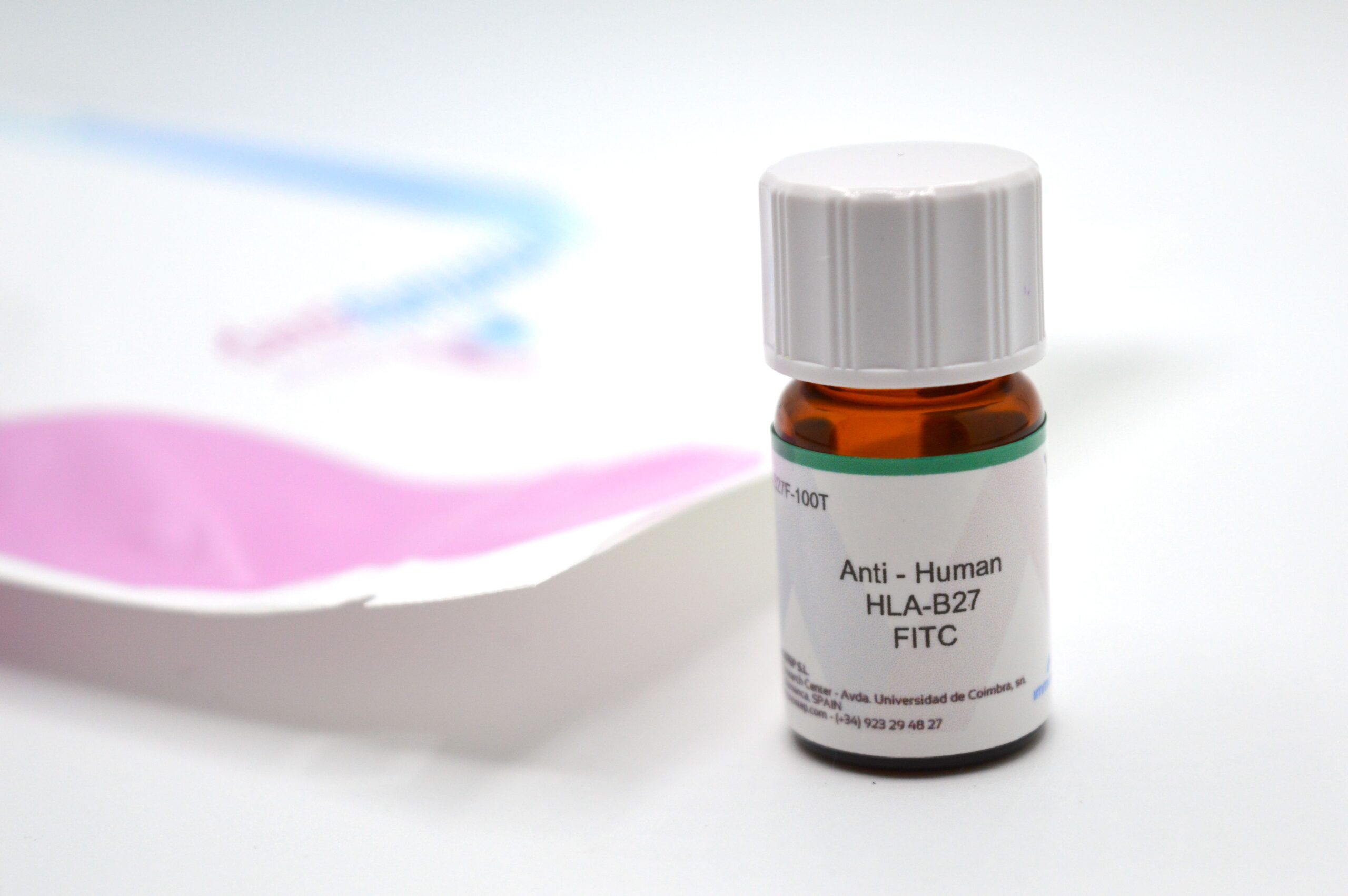- Products
- Oncohematology
- Antibodies
- Kits
- CAR T-cell
- Euroflow
- Single reagents
- Request info
- Resources and support
- Immunology
- Antibodies
- Single reagents
- Cross match determination (FCXM)
- FcεR1
- Ig subclasses
- Single reagents
- Kits
- TiMas, assessment of tissue macrophages
- Request info
- Resources and support
- Antibodies
- Exosomes
- Accesory reagents
- Software
- Oncohematology
- Services
- Peptide Production
- Design
- Modification
- Protein Services
- Expression and purification
- Freeze drying
- Monoclonal And Polyclonal Antibody Development
- Monoclonal
- Policlonal
- Specialized antibody services
- OEM/Bulk production
- Purification
- Conjugation
- Custom Exosome Services
- Isolation and purification
- Characterization
- Peptide Production
- Shop
- Support
- About Us
- Contact
- Shop
- Single Antibodies
- Anti- Human HLA-B27 (HLA-ABC-m3)
Anti- Human HLA-B27 (HLA-ABC-m3)
520,00 € excl.VAT
The monoclonal antibody Anti-HLA-B27 is directed against the HLA-B27 antigen, a class I surface molecule encoded by the B locus of the human Major Histocompatibility Complex (MHC). This antigen plays a key role in the presentation of microbial peptides to T cells, contributing to immune recognition and response 1.
HLA-B27 is expressed in approximately 7% of the Caucasian population, while a related antigen, HLA-B7, is found in about 22%2. The detection of HLA-B27 is clinically significant due to its strong association with inflammatory diseases, particularly ankylosing spondylitis. Over 90% of individuals diagnosed with ankylosing spondylitis express the HLA-B27 antigen, compared to only 7% of asymptomatic individuals3. This monoclonal antibody enables the identification of HLA-B27 specificity within the class I HLA allotype, supporting the diagnosis and monitoring of spondyloarthropathies. Flow cytometry using CYT HLAIB27F provides a rapid and reliable method for assessing HLA-B27 expression in clinical samples 3.
Furthermore, structural and functional studies have shown that HLA-B27 may contribute to disease pathogenesis through mechanisms involving misfolding, aberrant immune responses, and interactions with innate immune receptors.
Additional information
| Clone | |
|---|---|
| Isotype | |
| Conjugated | |
| Size | |
| Regulatory Status | |
| Format | |
| Protocol | |
| Volumen/test | |
| Storage | Store in the dark at 2-8 ºC |
| Other names | HLA class I histocompatibility antigen, B alpha chain, HLA-B, HLAB |
| Buffer | Aqueous buffered solution containing protein stabilizer and 0.09% sodium azide (NaN3). |
| Immunogen | Immune complex precipitated from HLA-B27 positive cell line (Bordin). |
| Concentration | 0,05 mg/ml |
Recomended usage
Immunostep’s HLA-B27 FITC is a monoclonal antibody intended for the identification and enumeration of cells expressing the HLA-B27 surface antigen, a class I molecule encoded by the B locus of the human Major Histocompatibility Complex (MHC). This antigen plays a key role in presenting microbial peptides to T cells. This reagent is effective for direct immunofluorescence staining of human tissue for flow cytometric analysis using 1 test for 106 cells.
Resources
Datasheet Safety Data Sheets
Technical Data Sheet (TDS) – (English). Safety Sheet (MSDS) – (English)
References
| Product description | Reference | Title | Authors | Journal | Year | |
|---|---|---|---|---|---|---|
| Product description | Reference | Title | Authors | Journal | Year |
Related products
-
CD15
246,00 € excl.VAT – 468,00 € excl.VAT Select options This product has multiple variants. The options may be chosen on the product page -
CD26
204,00 € excl.VAT – 531,00 € excl.VAT Select options This product has multiple variants. The options may be chosen on the product page -
CD11a
204,00 € excl.VAT – 531,00 € excl.VAT Select options This product has multiple variants. The options may be chosen on the product page -
CD25
204,00 € excl.VAT – 531,00 € excl.VAT Select options This product has multiple variants. The options may be chosen on the product page
